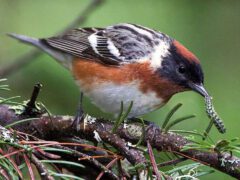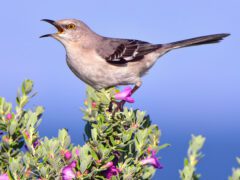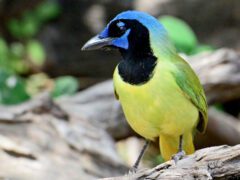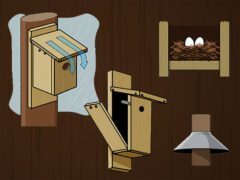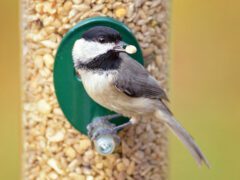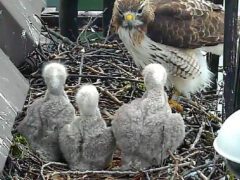Ring-billed Gull Similar Species Comparison
Main SpeciesRing-billed Gull
First winter
First winter birds begin to acquire pale gray feathers on their back while retaining a mottled brown look overall. Note short bill that is pink at the base.
© Patrick Maurice / Macaulay LibraryGeorgia, November 12, 2016Habitat
Found along coastal beaches, inland lakes, garbage dumps, parking lots, and freshly plowed fields.
© Joanna Brichetto / Macaulay LibraryTennessee, December 25, 2017Breeding adult
Medium-sized gull with a shorter bill. Breeding adults have black band across their yellow bill, yellow legs, a pale eye, and a pale gray back.
© Cameron Eckert / Macaulay LibraryYukon Territory, May 01, 2017Nonbreeding adult
Nonbreeding adults like this one have only a little bit of tan streaking on the head or neck, but other can have more tan streaking. Otherwise nonbreeding adults look similar to breeding adults with a black band across their yellow bill and a pale eye.
© Mason Maron / Macaulay LibraryIdaho, December 12, 2021Breeding adult
Medium-sized gull with fairly small bill. Breeding adults typically have clean white head, pale eye, and yellow legs.
© Jay McGowan / Macaulay LibraryNew York, July 10, 2015Second winter
Second winter gulls have tan streaking on the neck, head, and chest (like this one), but others have relatively little. Note the black band across the yellow bill.
© Tom Edell / Macaulay LibraryCalifornia, August 16, 2017First winter
First winter birds start acquiring gray feathers on their back, but still retain some brown feathers on their wings and have variable amounts of brown streaking and spotting on their head, neck, and underparts.
© Brad Walker / Macaulay LibraryNew York, February 27, 2016Juvenile
Juveniles are a patchwork of brown and white with a dark bill that is most often pink at the base.
© Davey Walters / Macaulay LibraryMassachusetts, July 28, 2016Breeding adult
In flight, note the small white spot on the tips of the outer primaries and relatively little black on the primaries.
© Ryan Schain / Macaulay LibraryMassachusetts, March 03, 2013Juvenile
Juveniles in flight have dark primaries and mottled inner wings with a wide, dark tail band.
© Tom Reed / Macaulay LibraryWisconsin, September 19, 2017First winter
First winter birds begin to acquire pale gray feathers on their back while retaining a mottled brown look overall. Note short bill that is pink at the base.
© Patrick Maurice / Macaulay LibraryGeorgia, November 12, 2016Habitat
Found along coastal beaches, inland lakes, garbage dumps, parking lots, and freshly plowed fields.
© Joanna Brichetto / Macaulay LibraryTennessee, December 25, 2017Breeding adult
Medium-sized gull with a shorter bill. Breeding adults have black band across their yellow bill, yellow legs, a pale eye, and a pale gray back.
© Cameron Eckert / Macaulay LibraryYukon Territory, May 01, 2017Nonbreeding adult
Nonbreeding adults like this one have only a little bit of tan streaking on the head or neck, but other can have more tan streaking. Otherwise nonbreeding adults look similar to breeding adults with a black band across their yellow bill and a pale eye.
© Mason Maron / Macaulay LibraryIdaho, December 12, 2021Breeding adult
Medium-sized gull with fairly small bill. Breeding adults typically have clean white head, pale eye, and yellow legs.
© Jay McGowan / Macaulay LibraryNew York, July 10, 2015Second winter
Second winter gulls have tan streaking on the neck, head, and chest (like this one), but others have relatively little. Note the black band across the yellow bill.
© Tom Edell / Macaulay LibraryCalifornia, August 16, 2017First winter
First winter birds start acquiring gray feathers on their back, but still retain some brown feathers on their wings and have variable amounts of brown streaking and spotting on their head, neck, and underparts.
© Brad Walker / Macaulay LibraryNew York, February 27, 2016Juvenile
Juveniles are a patchwork of brown and white with a dark bill that is most often pink at the base.
© Davey Walters / Macaulay LibraryMassachusetts, July 28, 2016Breeding adult
In flight, note the small white spot on the tips of the outer primaries and relatively little black on the primaries.
© Ryan Schain / Macaulay LibraryMassachusetts, March 03, 2013Juvenile
Juveniles in flight have dark primaries and mottled inner wings with a wide, dark tail band.
© Tom Reed / Macaulay LibraryWisconsin, September 19, 2017First winter
First winter birds begin to acquire pale gray feathers on their back while retaining a mottled brown look overall. Note short bill that is pink at the base.
© Patrick Maurice / Macaulay LibraryGeorgia, November 12, 2016Habitat
Found along coastal beaches, inland lakes, garbage dumps, parking lots, and freshly plowed fields.
© Joanna Brichetto / Macaulay LibraryTennessee, December 25, 2017Similar SpeciesLaughing Gull
First winter
First winter Laughing Gulls have a gray neck and smudgy head unlike juvenile and first winter Ring-billed Gulls. They also have a longer drooping bill than Ring-billed Gulls.
© James (Jim) Holmes / Macaulay LibraryYucatán, January 13, 2017Similar SpeciesLaughing Gull
Juvenile
Juvenile Laughing Gulls are more gray brown than the tan colored juvenile Ring-billed Gull. They also have thin eye crescents and a longer drooping bill.
© Max McCarthy / Macaulay LibraryNew Jersey, August 09, 2017Similar SpeciesAmerican Herring Gull
Breeding adult
American Herring Gulls are larger than Ring-billed Gulls with a bigger bill. Breeding and nonbreeding adults have pink legs, not yellow like Ring-billed Gulls. They also lack the Ring-billed Gull's black ring around the bill.
© Darren Clark / Macaulay LibraryNew Hampshire, June 05, 2017Similar SpeciesAmerican Herring Gull
Second winter
Second winter American Herring Gulls can be separated from immature Ring-billed Gulls by their larger size and bigger bill.
© Chris Wood / Macaulay LibraryNew York, November 08, 2015Similar SpeciesAmerican Herring Gull
Juvenile
Juvenile American Herring Gulls are best separated from juvenile Ring-billed gulls by size. American Herring Gulls are larger with a bigger bill.
© Evan Lipton / Macaulay LibraryMassachusetts, August 06, 2014Similar SpeciesCalifornia Gull
Breeding adult
California Gulls are larger than Ring-billed Gulls. Breeding and nonbreeding adults have a red spot on the lower bill and lack the namesake ring around the bill like Ring-billed Gulls. Also note dark eye on California, but pale on Ring-billed.
© Brian Sullivan / Macaulay LibraryCalifornia, August 01, 2008Similar SpeciesCalifornia Gull
Second winter
Second winter California Gulls can be separated from first winter Ring-billed Gulls by their larger size and darker gray backs.
© Grace Oliver / Macaulay LibraryWashington, July 01, 2017Similar SpeciesLaughing Gull
First winter
First winter Laughing Gulls have a gray neck and smudgy head unlike juvenile and first winter Ring-billed Gulls. They also have a longer drooping bill than Ring-billed Gulls.
© James (Jim) Holmes / Macaulay LibraryYucatán, January 13, 2017Similar SpeciesLaughing Gull
Juvenile
Juvenile Laughing Gulls are more gray brown than the tan colored juvenile Ring-billed Gull. They also have thin eye crescents and a longer drooping bill.
© Max McCarthy / Macaulay LibraryNew Jersey, August 09, 2017Similar SpeciesAmerican Herring Gull
Breeding adult
American Herring Gulls are larger than Ring-billed Gulls with a bigger bill. Breeding and nonbreeding adults have pink legs, not yellow like Ring-billed Gulls. They also lack the Ring-billed Gull's black ring around the bill.
© Darren Clark / Macaulay LibraryNew Hampshire, June 05, 2017Similar SpeciesAmerican Herring Gull
Second winter
Second winter American Herring Gulls can be separated from immature Ring-billed Gulls by their larger size and bigger bill.
© Chris Wood / Macaulay LibraryNew York, November 08, 2015Similar SpeciesAmerican Herring Gull
Juvenile
Juvenile American Herring Gulls are best separated from juvenile Ring-billed gulls by size. American Herring Gulls are larger with a bigger bill.
© Evan Lipton / Macaulay LibraryMassachusetts, August 06, 2014Similar SpeciesCalifornia Gull
Breeding adult
California Gulls are larger than Ring-billed Gulls. Breeding and nonbreeding adults have a red spot on the lower bill and lack the namesake ring around the bill like Ring-billed Gulls. Also note dark eye on California, but pale on Ring-billed.
© Brian Sullivan / Macaulay LibraryCalifornia, August 01, 2008Similar SpeciesCalifornia Gull
Second winter
Second winter California Gulls can be separated from first winter Ring-billed Gulls by their larger size and darker gray backs.
© Grace Oliver / Macaulay LibraryWashington, July 01, 2017Similar SpeciesLaughing Gull
First winter
First winter Laughing Gulls have a gray neck and smudgy head unlike juvenile and first winter Ring-billed Gulls. They also have a longer drooping bill than Ring-billed Gulls.
© James (Jim) Holmes / Macaulay LibraryYucatán, January 13, 2017Similar SpeciesLaughing Gull
Juvenile
Juvenile Laughing Gulls are more gray brown than the tan colored juvenile Ring-billed Gull. They also have thin eye crescents and a longer drooping bill.
© Max McCarthy / Macaulay LibraryNew Jersey, August 09, 2017Compare with Similar Species
Click on an image to compare
Species in This Family
Gulls, Terns, and Skimmers(Order: Charadriiformes, Family: Laridae)


































